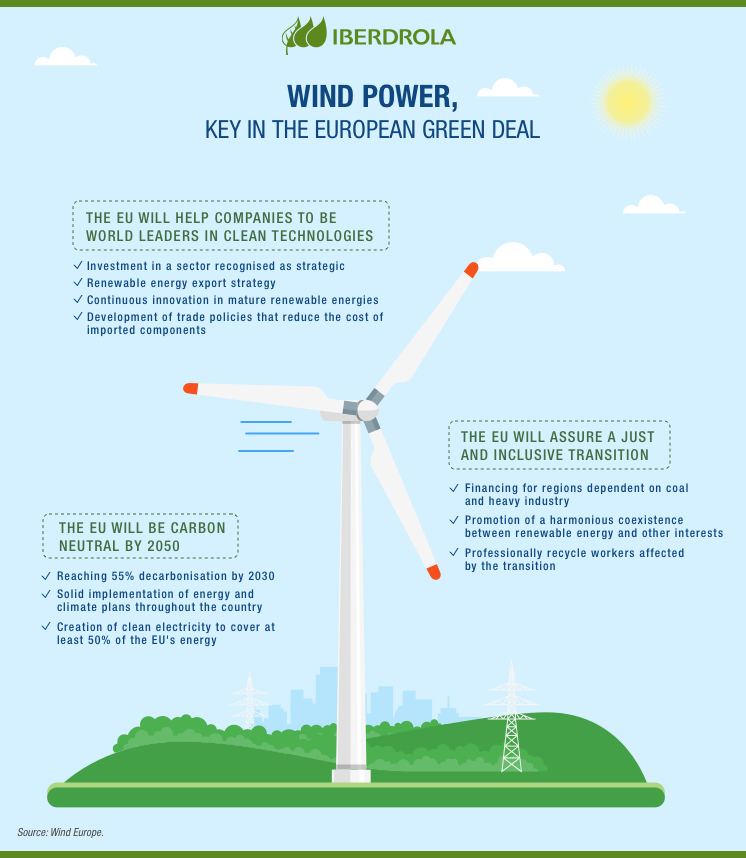European Green Deal
European Green Deal: much more than a strategy to combat climate change
In 2009, in the midst of an economic recession, the United Nations already pointed the way by launching a report entitled Rethinking the Economic Recovery: A Global Green New Deal. Its call went unnoticed, but today, with numerous indicators focusing on the impact of climate change on the planet, this concept is becoming topical once again with the objective of paving the way for sustainable growth. The European Union (EU) has now announced the European Green Deal.

Climate change is a reality and reality, as we know, is stubborn. The crisis caused by the coronavirus and its consequences might make us lose sight of problems like this, problems that are still there and have to be resolved. In recent years, numerous proposals have been put forward to combat climate change, but one that returns time and time again is the Green New Deal, a movement that seeks to save the planet for new generations based on sustainable growth. In that way, one of the most featured project is the one that was presented by the new European Commission, headed by Ursula Von der Leyen, in December 2019: The European Green Deal.
What is the European Green Deal (objectives)
The European Green Deal, which has received the support of major companies like Iberdrola, sets out a strategic road map with specific milestones that focus political action on a green and energy transition. Its plan, which has the strong backing of the German, French and Spanish governments, has the following objectives:
![]() To make the EU climate neutral by 2050.
To make the EU climate neutral by 2050.
![]() To protect human life, animals and plants by reducing pollution.
To protect human life, animals and plants by reducing pollution.
![]() To contribute to guaranteeing a fair and integrated transition.
To contribute to guaranteeing a fair and integrated transition.
![]() Development of clean energies, reliable and affordable, and developing the transition funding.
Development of clean energies, reliable and affordable, and developing the transition funding.
![]() Conversion of agriculture and rural regions.
Conversion of agriculture and rural regions.

Green
Deal
transport
Funding the transition
- The European Investment Bank (EIB) will become the European Climate Bank
- European Sustainability Plan
- Green Financing Strategy
- Promote the climate transition and sustainability in the multi-year Financial Framework
Clean, reliable, affordable sources of energy
- Review of energy laws
- Regulatory framework for gas
- Review of European taxation directive
Achieving climate neutrality
- Climate objectives review
- Extension of the ETS
- Climate pact
- Climate law
- CO2 border adjustment
Conservation of Europe's natural assets
- Biodiversity strategy 2030
Transition toward the Circular Economy
- New Action Plan to achieve a Circular Economy
A pollution-free Europe
- Sustainable chemical use strategy
- Clean air and water action plans
Local farming
- Local farming strategy
Transformation of farming and rural areas
- Vision for inclusion of rural areas
- European-African agenda
A modernised, simpler farming policy
- Proposed reform of the common agricultural policy (CAP)
Fair transition
- Mechanism for a Fair Transition that includes a Fair Transition Fund
- Promote the Fair Transition in the MFF
 SEE INFOGRAPHIC: The European Green Deal, a road map for transforming the European economy [PDF] External link, opens in new window.
SEE INFOGRAPHIC: The European Green Deal, a road map for transforming the European economy [PDF] External link, opens in new window.
European Green Deal proposals and policies
The European Green Deal contains a wide range of measures to promote a renewables-based energy mix, make progress in transport sustainability, spearhead a sustainable, efficient and circular industrial model, and so on. Below, we take a detailed look at the main proposals put forward within this ambitious project:
![]() Sustainable industry
Sustainable industry
Only 12% of the materials used in industry come from recycling. The proposal is that that companies should receive aid to modernise their processes and stimulate circular production that generates zero emissions. It will especially affect sectors such as textiles, electronics and plastics.
![]() Efficient construction
Efficient construction
The renovation of buildings, which currently account for 40% of energy consumption, will be key. Sustainable urban development is therefore proposed that invests in the energy efficiency of buildings.
![]() Clean energy
Clean energy
The production and use of energy accounts for more than 75% of the EU's greenhouse emissions, so the aim is to decarbonise this sector and prioritise the use of clean, renewable energy by modernising infrastructure and promoting energy efficiency.

 SEE INFOGRAPHIC: Wind power, key in the European Green Deal [PDF] External link, opens in new window.
SEE INFOGRAPHIC: Wind power, key in the European Green Deal [PDF] External link, opens in new window.
![]() Sustainable mobility
Sustainable mobility
The aim is to reduce emissions from cars, trains, shipping and air transport — transport accounts for 25% of the EU's emissions —. Sustainable mobility is therefore proposed that promotes the use of cleaner and more efficient public and private transport.
![]() Protection of biodiversity
Protection of biodiversity
The European Green Deal also promotes measures to protect biodiversity and ecosystems, to improve the quality of the oceans and forests, and to develop the concept of a green city that seeks to increase biodiversity in urban spaces.
![]() Sustainable feeding
Sustainable feeding
The aim is to reduce the use of pesticides and develop innovative techniques, such as foodtech, in agricultural processes, to ensure sustainable and quality feeding, and to increase organic farming, among other things.
![]() Reducing pollution
Reducing pollution
Obviously, doing away with emissions cannot but be one of the main objectives. But as well as clean air, measures are also put forward to achieve plastic-free seas and oceans and to improve citizens' quality of life.
Measures against climate change
Climate change is a battle to be won in the medium and long term, but with everyone's effort today and adequate mitigation and adaptation, such as the measures proposed by the UN, we will be able to begin to minimise the damage and promote more sustainable development. For instance, by promoting the so-called green jobs that are key to the future economy:
Measures to alleviate climate change
- Improve energy efficiency and focus on renewable energies.
- Promote public transport and sustainable mobility.
- Promote industry, agriculture, fishing and ecological stock breeding, as well as responsible consumption.
- Tax the use of certain fuels through green taxes.
Measures to adapt to climate change
- Build safer and more sustainable buildings and infrastructures.
- Repopulate forests and restore damaged ecosystems.
- Diversify crops so that they can adapt better to changing climates.
- Seek innovative solutions to prevent and manage natural disasters. External link, opens in new window.

Climate change benchmark
We are committed to a decarbonised and sustainable energy model.

Driving a sustainable transition
We are committed to a clean, reliable and intelligent model.

World leader in renewable energy
We began to focus on renewable energies more than two decades ago.

Promoting sustainable mobility
We lead the transition to sustainable mobility.




